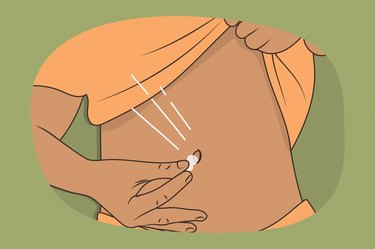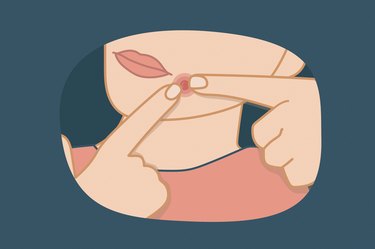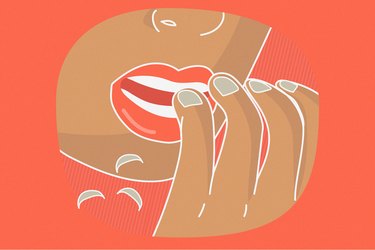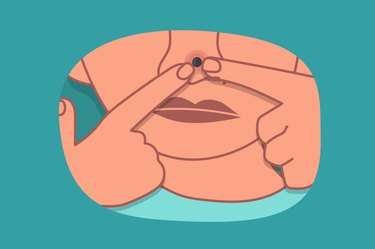
Earwax, boogers, toenail fungus — the body can be pretty gross sometimes. Don't forget to add "bellybutton gunk" to that list. And when you see something in there, you probably want to get it out. But is it bad to pick stuff out of your bellybutton?
Here, learn the effects of picking your bellybutton along with how to properly clean it out.
Video of the Day
Video of the Day
There can be a wide range of stuff in your bellybutton. First, we have lint, or — scientifically — "navel fluff," which is the fiber from clothing that comes off due to your shirt or sweater rubbing on your bellybutton as you move about the day, or from your towel as you dry off post-shower, according to a September 2018 study in Scientific Reports. The hair around your navel acts as a channel to direct said lint into your bellybutton.
But there's more: "By nature, being inverted means that the bellybutton can harbor bacteria and moisture more easily," dermatopathologist Gretchen Frieling, MD, tells LIVESTRONG.com.
As for exactly what kind of bacteria may be living in your navel? Researchers at NC State conducted a Belly Button Biodiversity Project to isolate bacteria from a wide range of bellybuttons. In their November 2012 research in PLOS One, they found 2,368 different types of bacteria lurking in their sample of 60 bellybuttons.
Much of the bacteria was unique to a specific person, but some of the most common types of bacteria found included staphylococcus, corynebacterium and streptococcus.
Your bellybutton may also contain dirt, sebum (oil) and dead skin cells, Dr. Frieling says. All together, this can cause comedones, like blackheads, to develop in your bellybutton; it's also possible to develop an ingrown hair in the area, which is called folliculitis, Dr. Frieling says. Epidermoid cysts, or benign bumps filled with pus, can also form, she says.
If you're gently pulling out some lint, you're fine — there's no reason to leave that stuff in when you find it.
Problems can occur, however, if you're actively picking at your bellybutton in such a way that you nick or scrape your skin or draw blood. At that point, you can be at risk for an infection, Dr. Frieling says.
"The more you irritate or pick at skin, the worse it will get, especially in an area that's more confined like the bellybutton," she says.
In addition, if you have a bellybutton piercing and are chronically picking at it, you can open yourself up to infection or the development of scar tissue.
Ramifications of chronic picking can include a staph or MRSA infection, yeast overgrowth or prurigo nodularis, which are itchy bumps that happen as a result of long-term picking, Dr. Frieling says.
Is Picking Part of a Bigger Problem?
If you feel that picking your bellybutton has become out of your control, it could actually be a symptom of a skin picking disorder called excoriation disorder or dermatillomania, which is a mental illness that has roots in obsessive-compulsive disorder, according to Mental Health America (MHA).
Chronically picking at healthy skin, wounds or scabs is one symptom. Seeing a mental health professional can get you on the path to treatment, which typically involves a combination of cognitive-behavioral therapy and sometimes medication, per the MHA.
First, know that it's normal to have some bacteria in your bellybutton. Your skin has an entire microbiome of its own, comprised of millions of bacteria, fungi and viruses that help to protect your body from the outside world, per a January 2018 review in Nature Reviews Microbiology.
Basically, you shouldn't actively try to make your bellybutton completely bacteria-free.
However, if you notice you're getting acne bumps, folliculitis or other bellybutton problems (like an itchy bellybutton or a smelly bellybutton), that may be a sign you need to do some additional cleaning.
Start by washing your bellybutton in the shower with soap and water. "Make sure you dry it off well after a shower, too," Dr. Frieling recommends. "Then, gently rub your bellybutton with a cotton swab dipped in rubbing alcohol." And try to keep the area dry after.
If you do scrape your skin, Dr. Frieling suggests moisturizing the area with Aquaphor and covering it with a bandage.
"Make sure the area is clean, and then leave it alone," she says.
If it's merely a piece of fuzz caught in your bellybutton, go ahead and gently wipe it out. Keep in mind, though, that actively picking inside your bellybutton can break the skin, resulting in infection and other problems if you're not careful.
So if your bellybutton really does need extra cleaning, you can use an alcohol-soaked cotton swab, and then keep the area dry.
Outside of that, it's best to have a hands-off approach: "You should really just leave your bellybutton alone," Dr. Frieling says.
- Scientific Reports:"Modeling the production of belly button lint"
- PLOS One: "A Jungle in There: Bacteria in Belly Buttons are Highly Diverse, but Predictable"
- National Library of Medicine: "Comedones"
- Mental Health America: "Excoriation Disorder (Skin Picking Or Dermatillomania)"
- American Academy of Dermatology: "Prurigo Nodularis: Signs and Symptoms"
- Nature Reviews Microbiology: "The human skin microbiome"
- PLOS ONE: "A Jungle in There: Bacteria in Belly Buttons are Highly Diverse, but Predictable"
- North Carolina State Public Science Lab: "Common Belly Button Bacteria"
Is this an emergency? If you are experiencing serious medical symptoms, please see the National Library of Medicine’s list of signs you need emergency medical attention or call 911.



